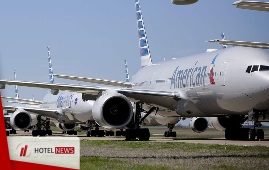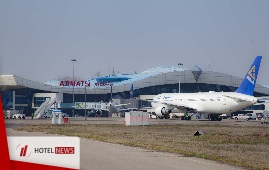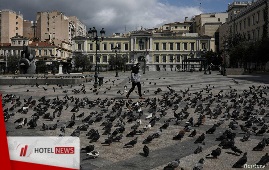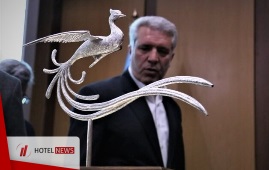
Airline Rating Analytical Institution Report; 5,000 aircraft will retire. The world's aviation fleet is preparing for its biggest clean-up following the outbreak of the coronavirus. The decision follows an analysis of maintenance costs, long-term fuel rates and environmental issues. New aircraft consume less fuel due to new engine and structure technology.
Create: May 20, 2020 Edit: May 21, 2020 International News
The latest statistics and report from Cirium Research Institute; Two-thirds of the world's passenger planes have been grounded. It seems that with the gradual reduction of traffic restrictions by different countries, the aviation industry has been revived and more flights to various destinations are underway. The number of active and operational aircraft increased on May.
Create: May 15, 2020 Edit: Jun 1, 2020 International News
The latest report from the World Tourism Organization (UNWTO); According to the report, the number of international tourists has decreased by 22% in the first three months of this year. On the other hand, the number of international tourists entering at the "March", has decreased sharply by 57%. According to the report, the extent of global tourism damage depends on the timing of the reopening of the borders. The World Tourism Organization predicts that, compared to the reopening of borders in July, September or December, the number of international tourists will decrease by 58 to 78 percent.
Create: May 8, 2020 Edit: May 12, 2020 International News
France 24 TV report; Economic activity in Greece has declined by 70 percent in recent weeks and is at risk of an economic crisis. Tourism is the second largest source of income for Greece after commercial shipping. The Greek islands are empty of tourists, and one in four hotels is on the verge of bankruptcy.
Create: May 5, 2020 Edit: May 6, 2020 International News
Hormozgan Governor Fereydoun Hemmati reports; Tourists are not accepted to prevent and deal with Corona virus in Hormozgan. In this regard, services will not be provided until the normal situation is announved.
Create: Mar 14, 2020 Edit: Mar 14, 2020 Regional News
The meeting was held yesterday evening to discuss hotel issues following the outbreak of the Corona virus. In this session, while receiving a report on the current situation, ways of resolving the crisis, seeking and following up on problems from relevant institutions were discussed.
Create: Feb 28, 2020 Edit: Mar 1, 2020 Regional News
TEHRAN – Japan and Austria have significantly downgraded their travel warnings on Iran, a caution they, amongst some other countries, issued following the deadly crash of a Ukrainian plane near Tehran last month. The jetliner, with 176 people onboard, was mistakenly downed on January 8 by the Islamic Revolution Guards Corps (IRGC) air defense system, a few hours after Iran fired dozens of missiles at a U.S. airbase inside Iraq in retaliation to the assassination of Iranian Lieutenant General Qassem Soleimani in Baghdad on January 3. “The Ministry of Foreign Affairs of Japan has eliminated its travel warning on Iran [asking its citizens to avoid ‘non-essential’ travel to the country] and it has also terminated depicting Iran’s security map with a warning sign,” ISNA reported on Tuesday. An advisory, which warned about traveling to Iran, is now deleted from the website of the ministry, the report added. Austrian ambassador to Tehran Stefan Scholz on Monday wrote on his Instagram account that his country has lowered its travel warning for Iran. “Austria has downgraded its travel warning for Iran, repealing its general advice against non-essential travels following a thorough reassessment of the security situation.” “We believe that the risk to Austrian nationals except for some specific border areas has changed. This decision will also further contribute to civil society contacts and commerce,” the envoy added. Late in January, the EU Aviation Safety Agency (EASA) approved that European airlines can return to parts of Iranian and Iraqi airspace. Germany’s Lufthansa was among airlines that canceled flights over the affected airspace. Inbound tours started to severely drop following the crash, triggering a major setback to Iran’s budding tourism industry. The blow, however, is being hoped to be amended as soon as possible by a comprehensive action plan Iran’s tourism ministry has put into practice since January 25. In the same time, Iran’s Minister of Cultural Heritage, Tourism and Handicrafts Ali-Asghar Mounesan issued a statement, inviting all travelers and holidaymakers to visit the ancient land, saying that the country-size guesthouse is wholeheartedly ready to receive tourists from around the world. The official emphasized that the Iranian government is trying its best to host incoming tourists by improving tourism infrastructure, offering attractive and pocket-friendly packages, as well as incentives such as visa waivers or 90-day visas on arrival. The 2019 Travel Risk Map, which shows the risk level around the world, put Iran among countries with “insignificant risk”, a category where the UK, Denmark, Switzerland, Norway, and Finland are placed in.
Create: Feb 19, 2020 Edit: Feb 19, 2020 Regional News
TEHRAN – Finally the wait is over for many tourism lovers in Iran as the country has introduced “Simurgh” - a huge mythical bird of Persian legend credited with possessing great wisdom – as its national brand for tourism. The national brand was unveiled by tourism minister Ali-Asghar Mounesan on Wednesday during the opening ceremony of the 13th Tehran International Tourism Exhibition, CHTN reported. Iran was ranked the third fastest-growing tourism destination in the globe in 2019, with 27.9 percent growth year on year, according to the latest statistics released by the United Nations World Tourism Organization (UNWTO). The Islamic Republic expects to reap a bonanza from its numerous tourist spots, including 22 ones that have been placed on the UNESCO World Heritage list. Under the 2025 Tourism Vision Plan, the country aims to increase the number of tourist arrivals from 4.8 million in 2014 to 20 million in 2025.
Create: Feb 19, 2020 Edit: Feb 19, 2020 Regional News
TEHRAN – The Iranian tourism minister on Monday said that the country will follow up on the issue of visa-free travel for mutual tourist groups with Russia at the upcoming [27th edition] Moscow International Travel & Tourism Exhibition (MITT), which will be held from March 17 to 19. “The Russian fair is very important [for us] so that we should have a strong and influential presence in this exhibition… One of the major issues is to pursue and finalize visa cancellation for Iranian and Russian group tours,” Ali-Asghar Mounesan said, CHTN reported. He made the remarks at a meeting with representatives of the private sector active in tourism projects. In December, Mounesan announced that Tehran was considering to allow Russian tourists to visa-free entry into the country to boost tourism after it granted the same privilege for some other nationals including Chinese and Omani passport holders. In 2017, Iranian President Hassan Rouhani and his Russian counterpart Vladimir Putin inked a preliminary visa-free agreement for certain tourist groups during their meeting in Moscow. Based on the agreement tour groups of 5 to 50 people heading to [easternmost parts of] Russia from Iran or vice versa are granted a visa-free stay of up to 15 days. MITT is the largest B2B travel & tourism trade show in Russia, attracting representatives of the tourism industry from Russia, regions and all over the world. According to organizers, a total of 22,289 travel industry professionals visited MITT in 2019. The participants ranged from the representatives of tour operators, travel agents to various other companies involved in the travel industry such as airlines, transport companies, hotels, and IT businesses.
Create: Feb 18, 2020 Edit: Feb 19, 2020 Regional News
WHO has developed a dashboard for Novel coronavirus (2019-nCoV) with the number of confirmed cases globally, which includes cases in China by provinces, regions and cities, as well as confirmed cases outside China by country. HIGHLIGHTS No new countries reported cases of 2019-nCoV in the past 24 hours. The infection prevention and control (IPC) global network is convened through weekly teleconferences with international IPC experts to discuss technical aspects of IPC measures, share epidemiological updates and experiences regarding the IPC measures put in place in affected countries. In consultation with the global IPC expert network, WHO has released three key IPC interim guidance materials on IPC measures during health care and home care, as well as advice on the use of masks in various settings. RECOMMENDATIONS AND ADVICE FOR THE PUBLIC During previous outbreaks due to other coronavirus (Middle-East Respiratory Syndrome (MERS) and Severe Acute Respiratory Syndrome (SARS), human-to-human transmission occurred through droplets, contact and fomites, suggesting that the transmission mode of the 2019-nCoV can be similar. The basic principles to reduce the general risk of transmission of acute respiratory infections include the following: - Avoiding close contact with people suffering from acute respiratory infections. - Frequent hand-washing, especially after direct contact with ill people or their environment. - Avoiding unprotected contact with farm or wild animals. - People with symptoms of acute respiratory infection should practice cough etiquette (maintain distance, coverncoughs - and sneezes with disposable tissues or clothing, and wash hands). - Within healthcare facilities, enhance standard infection prevention and control practices in hospitals, especially in emergency departments. - WHO does not recommend any specific health measures for travellers. In case of symptoms suggestive of respiratory illness either during or after travel, travellers are encouraged to seek medical attention and share their travel history with their healthcare provider.
Create: Feb 9, 2020 Edit: Feb 9, 2020 International News
Hotels in London saw RevPAR growth of 0.9% in Q4 2019, to £135.25 compared with the previous year, according to the latest UK Hotel Market Tracker: Q4 2019, produced by HVS London, AlixPartners and STR. Average occupancy for hotels in the capital dropped back slightly in the final quarter of the decade to 84.8%, although average room rates rose 1.9% to £159.53. The UK’s regional hotels saw RevPAR [rooms revenue per available room] fall in the quarter, down 2.7% to £50.73 and occupancy down marginally to 73.6%, while room rates fell by 2.1% to £68.94. “Softening occupancy will be a concern in London, particularly given the high number of hotels projects in the pipeline, although the fact room rates have risen by nearly 2% is encouraging,” commented HVS chairman Russell Kett. “Any improvement in yields will take longer to reach provincial hotels but they should start to see some change as we move through 2020. However, the active hotel pipeline, currently at 6% of supply outside London, will continue to prove challenging as it will in the capital.” With greater political certainty coming from the general election, transaction volumes in London saw an increase in Q4 to a value of £1.5bn, although transactions in the regions were down 38% to £2.2bn. The largest transaction in Q4 was the sale of the 211-room Fairmont St Andrews golf resort in Scotland to Great Century for a reported £135m. Moving forward investors are expected to be cautiously optimistic about a resurgence in transaction activity. “The recent UK election result and the ensuing Brexit decision is likely to make the UK more attractive to many investors,” commented HVS chairman Russell Kett. “This is likely to have a more immediate impact on transaction yields in London during 2020, although any improvement may be tempered by the pipeline of luxury hotels in inner London.”
Create: Jan 31, 2020 Edit: Jan 31, 2020 International News
On February 15th, 2003, the first group of 67 Chinese officially travelling for leisure arrived in Germany, based on the ADS Approved Destination System agreement China and Germany signed the year before, second in Europe only to the island state of Malta, while for the rest of the Schengen Area the ADS agreement came only into force in September 2004. Your humble editor had stopped a few years earlier to be an inbound tour operator for Chinese delegations and had just finished the first semester as a tenured university professor. Witnessing the high expectations of my former colleagues, all buying coaches, employing additional staff and moving into bigger offices, I wondered if I had taken the wrong decision to opt out of the business just before the biggest bonanza ever for the German China inbound tour operators, looking forward to enjoying a year without competition in Europe. Unknown at the time, in November 2002 SARS (severe acute respiratory syndrome) started in Guangzhou and spread to many countries in the world. On March 15th, 2003, the WHO issued a global alert about a new infectious disease, advising against any unnecessary travel to and from East Asia. On April 2nd, Chinese officials finally began reporting the severity and extent of the SARS outbreak. As a result the second quarter of 2003 saw almost no Mainland Chinese citizen arriving in Germany, pushing several inbound tour operators close to bankruptcy. For the whole year, the number of arrivals however reached the level of 2002, and 2004 saw an increase of almost 40%, as many of the trips to Germany influenced by the SARS crisis were only postponed, not cancelled. Globally the same happened: From 16.6 million in 2002 the number of outbound trips jumped to 20.9 million in 2004 despite the three-month hiatus. With the yet not fully named 2019-nCoV, things could turn out in a similar way, based on what is known until now. On the one hand the disease is spreading much faster, given the much improved domestic and international transport infrastructure available in comparison to 2003, on the other hand the Chinese government reacts in a much different way to the crisis. Among many others, starting from the 27th of January, all group travel from China has to cease. Individual travellers however will have a bigger incentive than before to go abroad. The biggest difference is clearly the fact that in 2003 outbound tourism was the least concern except for those few directly involved during the SARS crisis. In 2020 there are already articles published discussing the fate of the tourism industry of Thailand, Japan and other countries if the main source market China implodes. Via an open letter of the CATS China Association of Travel Services published on the 26th, the international partners have been asked to “introduce relative refund and changes policies to minimize Chinese tourists financial loss”. How much this will remain a wish or will become a demand, is one of the many unknown factors in the 2019-nCoV development. The main concern remains of course to minimize the loss of life in China. In all previous cases, being it SARS, MERS or the Lehman Brothers global economical crisis, demand bounced back stronger than before after two or three months. So it will be a good idea to use the time of the slowdown to train everybody involved in servicing Chinese customers, using the brand new CTT China Tourism Training. Let’s hope that the Year of the Rat will have a better ending than this dire beginning and that all our readers, their colleagues, family and customers will stay healthy.
Create: Jan 31, 2020 Edit: Jan 31, 2020 International News
